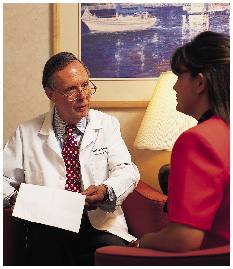![]()
The Genetic Revolution
![]() y lunch companion, a respected colleague and friend,
asked me how many hours of the medical curriculum were allotted
to my course in human genetics. I replied, "Thirty-five,"
while silently reflecting on the inadequacy of the less than
1 percent of curricular time devoted to a discipline whose comprehension
is fundamental to all of medical practice. He responded with
amazement, "Why, that's more time than I get for my subspecialty
in internal medicine!" He then questioned how such imbalance
could be tolerated and challenged me to provide a single example
of how genetics is applicable in clinical practice. (Perhaps
he was joking, trying to provoke me with his serious face; he
is like that.) I took the bait: "Where have you been? Have
you heard of the genetic revolution?"
y lunch companion, a respected colleague and friend,
asked me how many hours of the medical curriculum were allotted
to my course in human genetics. I replied, "Thirty-five,"
while silently reflecting on the inadequacy of the less than
1 percent of curricular time devoted to a discipline whose comprehension
is fundamental to all of medical practice. He responded with
amazement, "Why, that's more time than I get for my subspecialty
in internal medicine!" He then questioned how such imbalance
could be tolerated and challenged me to provide a single example
of how genetics is applicable in clinical practice. (Perhaps
he was joking, trying to provoke me with his serious face; he
is like that.) I took the bait: "Where have you been? Have
you heard of the genetic revolution?"
A single example? In the Ashkenazic population one of 16 persons carries an inherited mutation for colon cancer-a dominant mutation that doubles the risk and accounts for 30 percent of colon cancer in that population.

![]()
In that same population 1 of 50 carry a mutation for breast and/or
ovarian cancer. Such mutations, again dominantly transmitted
in families, cause breast and/or ovarian cancer sometime during
the lifetimes of up to 100 percent of carriers. Selective testing
and appropriate follow-up with diagnostic, medical, and surgical
prophylaxis can save lives of carriers and prevent unnecessary
procedures for non-carriers. Yet only a small fraction of proper
referrals are made. Perhaps physicians in practice had insufficient
curricular hours in genetics to prepare them for the exploding
need, as discoveries continue in genetic medicine.
What discoveries? For more than 50 years we have recognized that 10 percent of major cancers are inherited. (More recently we have come to understand that virtually all cancers result from accumulation of somatic mutations, thus are genetic in origin even when not inherited from parents or passed on to children.) What has been missing until the last few years is the ability to detect cancer mutations, in the DNA of cancer patients and family members at risk, by simple, commercially available blood tests. This testing has changed the standard of medical practice. Now physicians must consider the immediate patient and the extended family. Recent court decisions in several states would require that physicians caring for cancer patients find family members at risk and extend care to them.
Patients and their relatives want to consider testing after confirming its applicability and informativeness. However, testing is unavailable except through a licensed physician, who must attest that sufficient counseling has been extended for fully informed consent. Psychological referral should be available, and issues of family involvement, confidentiality, and insurance discrimination need explanation, too. Fulfilling those requirements generally takes 60 to 90 minutes. National standards of practice require that test results be given in person with explanations sufficient to satisfy each patient, and that requires another 20 to 40 minutes. Few if any physicians in primary practice or in medical or surgical oncology are able or inclined to spend this time for genetic counseling, which is not their traditional expertise.
At the Sylvester Comprehensive Cancer Center genetic counseling by a board-certified counselor is available to all patients. Indeed, genetics is applicable for cancer in clinical practice. Perhaps my friend was joking, but I am serious!
![]()
![]()
![]()
![]()
![]()